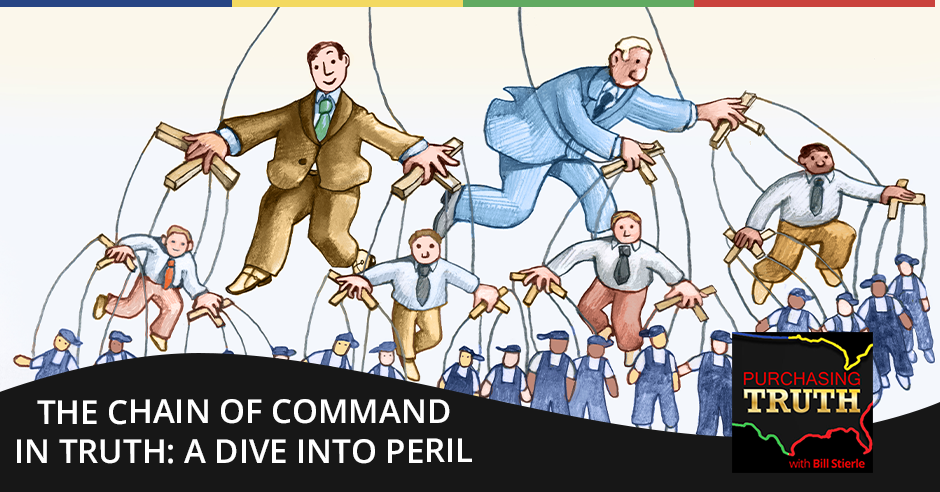The Chain of Command in Truth: A Dive into Peril
Subscribe Today!
Have you ever wondered what happened during the events that happened on January 6 and thereafter? Where does the truth stand when it comes to the attack on the Capitol? Bill Stierle and Tom discuss the truth and the chain of command in the government by diving deep into Bob Woodward and Robert Costa’s book, Peril. They discuss all sorts of different perspectives on the book, including the revelations that came out after January 6th and the insurrection that happened during the transition from former president Donald Trump to President Joe Biden. Tune into this episode and learn valuable insights to ponder on and help you understand the truth behind the chain of command in the government and the key people that affect it, be they from inside or outside of the rule of law.
---
Watch the episode here
The Chain of Command in Truth: A Dive into Peril
We've got quite some interesting topic to discuss that has different perspectives that are going to be fun to talk about. The departure point is the new book that Robert Woodward is a part of named Peril and the revelations that came out of that with General Mark Milley. Being concerned with January 6th, 2021, with President Donald Trump and the insurrection that was incited. To then be speaking directly with Chinese military leaders and also with Nancy Pelosi about what are we going to do if this guy all of a sudden tries to start a war, like a classic wag the dog sort of thing.
"I'm going to start a war to distract from this thing I'm trying to do insurrection-wise to make sure the vote was not certified or whatever." It's interesting to see that a general would put what I'm sure he thought was country over party and concern about international relations and how the Chinese might react. It's interesting to think about how we did it because we have the transcripts. We know what he said and, more importantly, Bill, from your perspective what he didn't say that he could have said.
The big part of the show is how do you communicate better, more effectively and have more impact. When you're trying to give reassurance or comfort to somebody, you also are trying to meet multiple objectives/multiple needs at the same time. How do you do loyalty or sit in the chain of command and at the same time as doing protection and safety for the nation, for your troops, for the folks and not to put them in harm's way, unless it's absolutely positively necessary? People could say, “It's not General Mark Milley's call to do that. The President is allowed to put people in harm's way any time he wants them to."
That one's a little tough because we're looking for a level of integrity and a level of protection. Also, a level of accountability and integrity with the role in the identity of the President and the role in the identity of General Mark Milley. It's difficult because the chain of command, in truth, means that I'm trying to meet the need for safety for my troops by meeting the need for reassurance to the Chinese general at the same time as following the integrity and the chain of command. How do I do all those at once?
The word lie tries to creep its way in here but what needs to be creeping in here is the word choice. How do you get the choice to take place? Tom, it always brings me back to the court scene in A Few Good Men. It's like why were there two orders. Why was the order because he was not safe and I was transferring them off? Are there people that follow orders?
If you told him that then this would have been true and you told them that then that would have been true. How come you had to give two orders? The general, in that case, was caught between two positions. In this case, we have another general caught in two positions and the order wasn't given but the reassurance was given that if there was such an order, we would let you know so you can protect your people and we can protect our people. The order that's being given is not from a safe person the way I think. All of a sudden, General Mark Milley’s in trouble the way of how does he get to make the call?
That is where our government currently is. The need for integrity and protection is not fully met. They're walking a gray line between loyalty to a person, loyalty to a nation, to America or to the oath that they took to follow the chain of command. Employees sign this away when they come in for their job interviews. They've got to sign a loyalty to not to sell company secrets, not to give away the company's database or steal the company's database because it's the company's and it doesn't matter. They sign the paper.
I actually think in Corporate America, this kind of action is where somebody who's not the CEO of the company makes a decision and withholds information. The CEO does what they think is best, despite a leader. That type of thing probably happens a lot more. I've seen it happen in Corporate America. It's quite another thing when you're talking about the country, nuclear weapons and international affairs. I know that General Mark Milley did what he believed was the right thing to do. He was going to protect the country, the nation, the citizens. He's on the military, not putting them in harm's way necessarily.
If an order came through from President Trump that was inconsistent with what he believed was the right thing to do, he talked about doing it. He didn't actually do it. There is a distinction there. I don't know if you can have treason for thoughts or is it a treasonous act to talk to somebody about something you would do in a hypothetical situation. Maybe it is.
To give a little bit of awareness to people, President Donald Trump didn't put out the bribe to the Ukrainians. Did he? He was talking about it generally as a favor I liked for you to do for me. It's hard because it depends on the perspective or the lens you're looking for here. It's what two different human beings version of the greater good? There are some laws that are written about both people's actions. Yet, as soon as you start talking about enforcing the action for Trump or enforcing the action for General Mark Milley, you've got to be able to talk to how to enforce the action for both. Is that what's going to happen to General Mark Milley or not? All of a sudden, this thing shows up because there are always secrets that a family has, a community has, a business has or a country has.
This leans into the narrative of, there's a dark government, a cabal of people that are making decisions that are outside the rule of law. We don't expose the things that the NSA, the CIA or the FBI, all the things that they say or do in order to get the answers that they're looking for or the actions that they'd like to take place. We're not looking at that. It's not to say we're supposed to or not supposed to have that level of transparency because it's like telling children about a difficult thing that adults do. You are not telling them everything that adult does. It would fry their brain. "You're telling me what? There are people that get married to many people? There are people that go to parties that have XYZ elements in it?" We could think about that scope of exposure. It destabilizes a government, company, family, community, religion or practice.
These things that have happened, decidedly we could say, have had contributed to destabilizing our government. You brought up the Ukraine call with President Donald Trump and interestingly, it was Alexander Vindman who was the whistleblower. He came out and said, “What the President did was wrong.” President Donald Trump was impeached over it, acquitted eventually and then President Donald Trump retaliated against Alexander Vindman and fired him. He forced him to out of the military. Here we have General Mark Milley, who has had conversations with foreign leaders and even Nancy Pelosi about what-if scenarios. He probably had to know at the time what he was doing. He could be dismissed for it. He could be fired. Don't you think he probably knew it? He said, “I don't care. This is worth it. I'm going to protect the nation.”
I think he went the other way with it. He stepped into the narrative of his most powerful sentences. "Don't you think there's going to be a retaliation?" He goes, “This is the United States of America. Right matters.” When Alexander Vindman said right matters and then got fired for it, that that type of damage towards our nation was difficult, as well as sending a signal to all the other whistleblowers, "If you want to bring it on, be ready for the level of the consequence of losing your job." It's one thing not to get protection in a business because you can't as much. A person fires you for unjust causes, for blowing the whistle or whatever and the business goes on, mops it up a little bit and keeps on polluting just fine.
It goes back to the old way of doing bad things to the environment or whatever. You want to shrug your shoulders and say, “That's the way businesses.” The mindset is, "How's this going to affect the bottom line? I don't have to clean it up or I don't have to pay for cleaning it up. I throw trash all the time and I'm making XYZ amount in it. It'll cost me another 15 cents on a dollar to clean it up. I'm not going to do it." The level of accountability can have a low consequence to it. Alexander Vindman thought, “I'm untouchable because this is the United States of America.” He learned, experienced and his brother did, who is ancillary to the thing. He got fired for no reason.
Why are you firing him? He was not even in the same department. That type of retaliation in the United States has been done for a long time. Now, President Joseph Biden said, “I trust General Mark Milley.” He didn't say anything else. After the hearing, there are going to be people asking for him to resign at that hearing. He'll say no and they're going to be stuck because the sentence, "Makes me leave. How are you going to make me," it's something that Bill Maher used to say. It's like, “I'm going to do whatever I want. Make me.” It has this 6, 11 or 12-year-old quality of defiance. It's very young. You used to have six-year-olds. You know what that's like. “Make me go to bed.” Regrettably, we need more adult nuanced voices to be able to talk to and at these experiences because we know.
I want to ask you a question, Bill. I'm sure at the time we can find interviews with President Joseph Biden as a candidate in 2019 as the whole Ukraine scandal is going down and the first impeachment trial is going down, talking about how Trump broke the law and he should be impeached. Alexander Vindman was an honorable loyal to America and coming forward with telling the truth. Do you think that President Joseph Biden, by saying, "I trust General Mark Milley, I have faith in General Mark Milley," is taking himself out of alignment with the chain of command and the rule of law? I know he's the President and he can do what he wants now in this regard but is he on the right side of the issue in terms of a military officer that goes around the chain of command?
He didn't put any wiggliness in his words. There's a consequence to that. "I trust General Mark Milley," means that I have confidence in him and in his ability as a general to “Do the right thing.” I'm going to give President Joseph Biden a couple of sentences here. Wouldn't it have been interesting for President Joseph Biden to have said, “During that time, our nation was in great peril? We have been split along issues many times and anytime the military stands up for protection safety for our troops, I'm going to trust that person.” He now didn't say, “I trust General Mark Milley. He's implied he's on my side.” It's like, “Any person that is observing the level of conflict that was taking it at that time. I'm going to pick the person and trust the person who's going to bring a nation to peace and stability ahead of somebody that is going to bring the nation into conflict. I'm picking that person. I trust General Mark Milley.”
Notice how I cut off the edge of it because I'm empathizing with the decision-maker at the moment. The decision-maker is experiencing instability, not safety, not confidence in trust and leadership and he's picking safety and protection for others ahead of the chain of command. We don't want the person to do that all the time but in this time, he actually could've put a shade on the President if he wanted to. As an adult, these decisions are very hard. I think I called somebody a non-adult.
It's dealing with the decision-making and the mindset of different people as they pursue different needs, Tom, that makes the biggest difference. I did a session with an executive where this executive is learning how to communicate so they can become a better leader. They were given a message from their leadership that wasn't going to make them any money. It was to appease somebody else and it was going to cost the company a lot of money. The guy was going like, “Why am I doing this thing? It's not valuable.” Empathy and compassion say, “Here's the good reason why that person's making that junky choice.”
I think if there were more empathy and compassion, perhaps in some of these calls, which by the way, the calls between General Mark Milley and the Chinese general were recorded and transcribed or has conversation with Speaker Nancy Pelosi. If empathy and compassion were used, that actually could have preemptively lowered the temperature on this whole issue once it came out. That's something that, unfortunately, I think a lot of military leaders whose needs are more about loyalty and these other things. They're not empathetic.
They're more sympathetic than they are empathetic, that's for sure. The empathetic sentence would be like this, “Madam Speaker, I hear that you're saying that he's crazy.” If he would've said that after the first time she said it, she would not have said it again. She wouldn't have said, “You know he's crazy.” She literally said the sentence crazy 3 or 4 times in the transcript. General Mark Milley could have caught her off from that by saying, “Madam Speaker, you'd like me to hear that he's crazy.” Now, watch how I'm going to turn this into an empathy sentence. “You're feeling worried and scared. You want to make sure that our troops and our people are protected. Is that correct?”
She would have then said yes and not have said the next three lines about crazy. She wouldn't have because he heard her and he empathized with her feeling scared about stability and protection for people. All of a sudden, you see that on the transcript. You're looking at General Mark Milley not as somebody that's agreeing with Speaker Nancy Pelosi but actually empathizing with her. His internal world might be, “You're right. I've watched him. He said way too many crazy things.” He might have that chatter in his mind but on paper, you're not seeing that. What you're seeing on paper is, “I am committed to the safety and protection for our troops. I am interested in making sure that there are actions only taken that are only to be taken in alignment with the legal things.”
He could have gone right down the path of empathy, going like, “I feel concerned about the need for integrity and making sure that safety is taking place. No, I'm slipping in the primary need for integrity. I want to make sure that there's loyalty to the troops and loyalty to our nation and for the values that we stand for.” That's another line of empathy that looks great on paper. All of a sudden, it's a weird thing to say but that transcript comes up, people turn right again. It's like, “How about General Mark Milley for President? He's a heck of a leader because look at how grounded he is in the face of conflict, in the face of this situation, the circumstance."
What do you think that General Mark Milley might have said to Chinese General Li Zuocheng? It's interesting when they're talking. "The Chinese leadership was stunned and disoriented by the televised images of the attack on the American legislature," is the quote. General Mark Milley says, “Things may look unsteady but that's the nature of democracy, generally. We are 100% steady. Everything is fine but democracy can be sloppy sometimes.” Interesting.
It's an interesting explanation, sympathy and metaphor for that experience. What empathy might've looked like is, "I imagine from your side and your leadership might be feeling a little bit anxious and are calling me for reassurance and trust that the government and the military are stable over here. Is that correct?" The Chinese general would have said, “Yes.” Now you've reduced the emotional load inside the other general. All of a sudden, you can give the next line of empathy was which is, "Is there something that I can say or do so that you know that there is stability here in the United States? There isn't going to be a reaction/overreaction to the election that we went through." Let the Chinese person ask for the thing rather than offer what he offered.
General Mark Milley volunteered, "I'll give you a warning."
I'll give you a warning of this coming. No, if they would've said to them and it was on the transcript that the transcript said, “I want to make sure that our leadership is not in a physical conflict that costs lives and that there's not going to be action or an overreaction on our country.” All of a sudden, it would show the Chinese that they have the same concerns that we do regarding the protection of life and best interests and the need for order. They focus on order and structure and good behavior too. The way they do it is not the same as the way we do it. The way they do things or the way they change things around is not fully the way we do things. Truth and respect have different perspectives there.
We want to pay attention to what is our best language that we can use to deescalate a situation yet stay firm to our values, loyalty to the country, service, respect towards the country and the rule of law. How do we honor people getting to say whatever they want to say and be able to speak back in an effective way when they do say something pretty junky or awful? That's what this is all about. How do we say better things at our companies, our families, in our world so that the escalation stays low?
I certainly think that there are many ways our society, in general, here in the United States, is in need of more of that.
We got to do more of how do we focus on how do we protect ourselves and make sure that we get safety in our environment, which we're currently working on with the health crisis. I think that's something we probably could pick up next time. How do you talk through the health crisis? 1 in 500 people have died of COVID in the United States or something close to that.
That is according to John Hopkins University, who's been keeping the numbers since the beginning, the official numbers. That is true. Let's do that next time. That's a great thing we can tee up because I think it's not theoretical for people in the abstract like, “These are leaders in government that are doing these things and whatever.” In my mind, as Ross Perot used to say, “This one's where the rubber meets the road.” This one is relatable to every American because we're all dealing with COVID. Is it as bad as they say it is? Is it not? Is the vaccine safe? Is it not? Do we need to wear masks in schools are not? The whole thing, everybody's dealing with these things. It's a good thing to address next time.
More to come on that, Tom and any assistance that anybody needs regarding communicating through difficult situations, feel free to reach out.
I would especially like to add to that, Bill, if you're on a school board for instance or you're trying to advocate for your position to a school board. That's happening all over the country and people could use some language and messaging assistance, I would think.
It is a thing. Thanks for reading. Thanks, Tom, for helping. We appreciate it.
Thanks, Bill.
Important Links:
- https://www.CNN.com/videos/media/2021/09/15/woodward-costa-book-trump-milley-call-china-leighton-sot-newday-hnk-vpx.cnn
- https://www.CNN.com/videos/media/2021/09/15/alexander-vindman-woodward-trump-book-cpt-vpx-new.cnn
- https://www.CNN.com/2021/09/15/politics/white-house-defends-milley/index.html
- https://www.CNN.com/2021/09/15/politics/milley-woodward-china-trump/index.html
- Peril
Love the show? Subscribe, rate, review, and share! https://billstierle.com/podcast/New Paragraph








